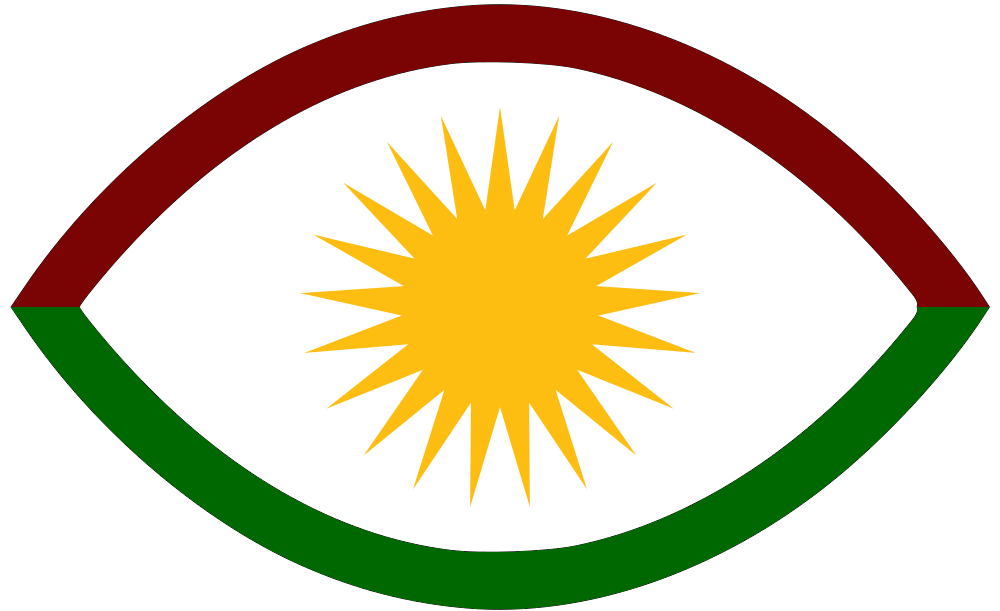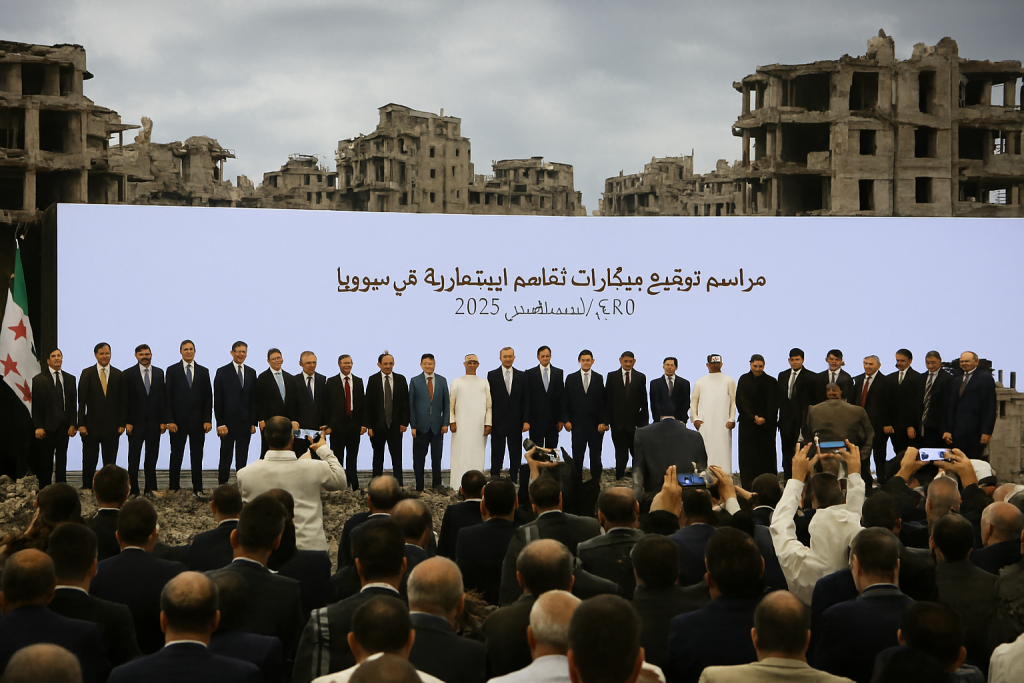“The future of a prosperous and peaceful Syria is in the hands of Syria and its regional partners, like Qatar’s UCC and Türkiye’s Cengiz and Kalyon groups who were awarded the Build-Operate-Transfer for the new Damascus International Airport. With POTUS’ lifting of sanctions, I was happy to attend the signing ceremony in Damascus today. The path to recovery must begin with the fits and starts of building a foundation of security and stability, then followed by government systems and ultimately enterprise and prosperity.” – US special envoy to Syria Tom Barrack.
On august 6th 2025 the Syrian Transitional Government unveiled an investment memorandum worth 14 billion dollars.
It’s important to clarify that, despite portrayals in Syrian media and by U.S. envoy Tom Barrack, these agreements are not binding investment contracts. What has been signed are memorandums of understanding—non-binding pledges in which foreign entities express intent to invest in and rebuild specific infrastructure projects. No formal contracts securing actual funding or execution have been finalized, making the announcements more symbolic than substantive.
U.S. envoy Tom Barrack has publicly emphasized that these investment initiatives are proceeding under what he describes as “POTUS lifting of sanctions” on Syria. However, this characterization is misleading. The sanctions have not been lifted; instead, a temporary 180-day waiver was issued, effective March 23, 2025. This limited waiver allows for specific activities under strict conditions, but does not constitute a full repeal of U.S. sanctions—making Barrack’s framing both premature and politically charged.
This strategy is designed to accelerate the lifting of sanctions — not by meeting the required conditions, but by exerting political pressure on the U.S. President. It leverages the anticipation of major Gulf states and influential allies of the President, all poised to invest in Syria’s reconstruction, as a persuasive argument to ease restrictions prematurely.
Moreover, the use of foreign shell companies—like the Italian-registered UBAKO, which is in fact owned by Syrian nationals and was awarded the $2 billion Damascus Towers contract—is a deliberate tactic to fabricate the illusion that non-Arab, international investors view Syria as a prime destination for capital. In reality, it’s a narrative engineered to mask domestic interests behind foreign façades.
The investment memorandum outlines a strategic commitment of $8 billion toward the revitalization and modernization of key infrastructure in Damascus. The initiatives include:
- $4 billion allocated for the comprehensive reconstruction of Damascus International Airport, spearheaded by Qatar’s UCC Holding.
- $2 billion dedicated to the development of a subway system in Damascus, with funding and execution led by the United Arab Emirates.
- $2 billion invested in the construction of the Damascus Tower Project, undertaken by the Italian company UBAKO.
- An additional $6.4 billion investment pledge from Saudi Arabia, announced earlier, which has now been formally incorporated into the memorandum.
Investigative research unveils that the investment deals are stipulated through several shell companies.
UBAKO, an Italian-registered company, signed a $2 billion investment memorandum with Syria’s transitional government—led by Ahmad al-Sharaa under the Jolani faction—to develop the ambitious Damascus Towers project.
Investigative research reveals that UBAKO was registered in June 2022 with just one employee. In its first fiscal year, the company reported a loss of approximately €3,000, followed by a modest €200,000 in revenue the next year. Its total available capital stands at a mere €16,000. Despite this minimal financial footprint and lack of operational capacity, the Syrian transitional government proceeded to sign a staggering $2 billion investment memorandum with the company—raising serious questions about the legitimacy and transparency of the deal.
Further scrutiny of UBAKO reveals troubling inconsistencies. The company’s official website—registered only three months ago in May 2025—features a social media link that doesn’t lead to a corporate account, but instead redirects to the private profile of a Syrian individual named Bassem al Sabaa. On his account, al Sabaa has published 25 videos detailing the engineering behind the Damascus Towers project, strongly suggesting he is the true architect and likely owner of UBAKO.
Al Sabaa also claims to own multiple unnamed companies in the United States, Lebanon, and Syria, a pattern reminiscent of the opaque business networks that Tom Barrack, a known associate of high-level U.S. political figures, has publicly embraced. The parallels raise questions about whether UBAKO is part of a broader strategy to obscure Syrian ownership behind foreign corporate façades.
UBAKO:
- Inflated Credentials: Claims decades of experience, yet was only registered in June 2022—barely three years ago.
- Disproportionate Deal: Awarded a $2 billion contract despite having just €16,000 in available capital.
- False Foreign Identity: Marketed as an Italian firm, but digital traces point to Syrian ownership, notably linked to Bassem al Sabaa.
- Opaque Operations: No public records of prior contracts or projects, raising serious doubts about its legitimacy and capacity.
UBAKO stands as a textbook example of a shell company: no operational footprint, no transparent structure, and no discernible purpose beyond serving as a conduit for opaque financial maneuvers. Its sudden emergence, paired with the involvement of Tom Barrack—a figure long entangled in high-level political and economic dealings—raises serious concerns about the true intent behind these so-called investment memorandums. Far from offering a path to recovery, these dubious arrangements risk entrenching the very dynamics that have devastated Syria: foreign manipulation, elite profiteering, and the erosion of public accountability.
If Syria is to rebuild on a foundation of integrity and sovereignty, it must reject the illusion of progress offered by shell companies and the intermediaries who enable them.
KurdistanMonitor is an independent conflict-monitoring initiative committed to providing accurate, unbiased, and freely accessible information to everyone. We operate with full editorial independence and have no affiliations with any political, governmental, or organizational entities.


